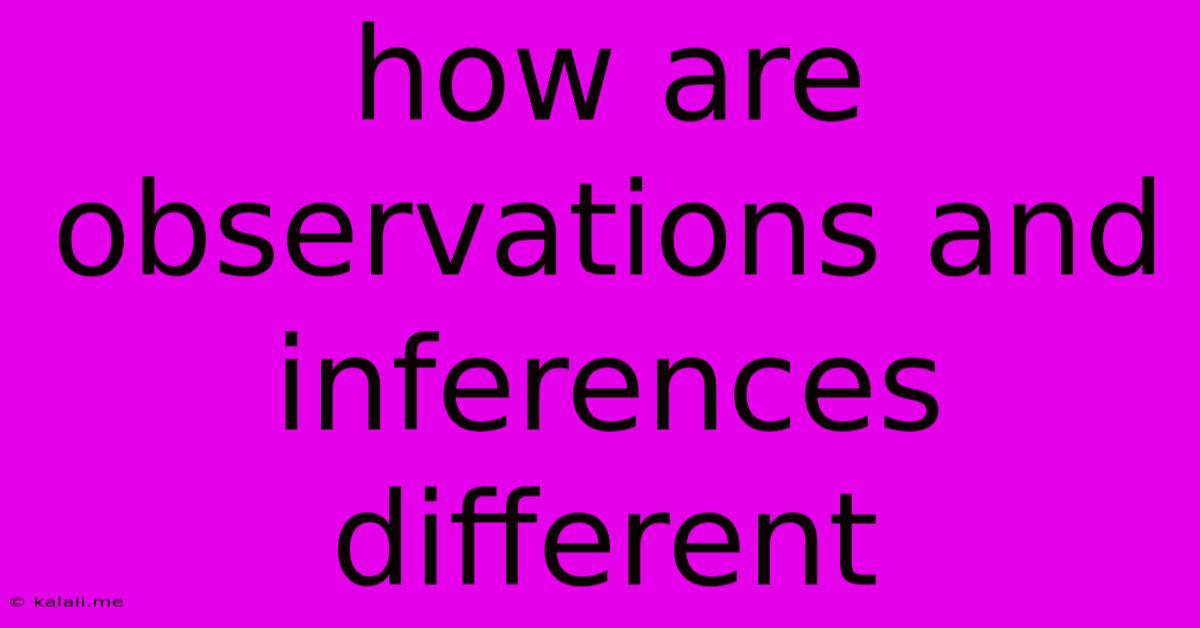How Are Observations And Inferences Different
Kalali
Jun 15, 2025 · 3 min read

Table of Contents
How Are Observations and Inferences Different? A Crucial Distinction in Science and Everyday Life
Observations and inferences are two fundamental concepts in scientific thinking and critical analysis, often confused but distinctly different. Understanding their differences is crucial for accurate data interpretation, logical reasoning, and effective communication. This article will clarify the distinction between observations and inferences, providing practical examples to enhance your understanding. This will help you avoid making assumptions and ensure your conclusions are grounded in evidence.
What is an Observation?
An observation is a statement based on directly perceived sensory information. It describes what you see, hear, smell, taste, or touch. Crucially, observations are objective and factual. They should be free of personal opinions or interpretations. Think of it as recording the data exactly as it is presented to your senses. Strong observations are detailed, specific, and measurable whenever possible.
Key Characteristics of Observations:
- Objective: Based on factual data, free from personal bias.
- Specific: Uses precise language and detailed descriptions.
- Measurable: Whenever possible, uses quantifiable data (e.g., length, weight, temperature).
- Verifiable: Another observer should be able to make the same observation under similar conditions.
Examples of Observations:
- "The liquid is clear and colorless."
- "The plant is 15 centimeters tall."
- "The metal object feels cold to the touch."
- "The bird is singing a high-pitched melody."
What is an Inference?
An inference is a conclusion drawn based on observations, prior knowledge, and reasoning. It is an interpretation or explanation of the observed data. Unlike observations, inferences are subjective and can vary depending on individual experiences and perspectives. While inferences are valuable for forming hypotheses and understanding phenomena, they must be clearly distinguished from direct observations.
Key Characteristics of Inferences:
- Subjective: Based on interpretation and personal understanding.
- Explanatory: Attempts to provide a reason or explanation for observations.
- Hypothetical: Often presented as possibilities rather than certainties.
- Testable: Good inferences can be validated or refuted through further investigation.
Examples of Inferences:
- Observation: "The ground is wet." Inference: "It rained recently." (Other inferences could be possible, such as a sprinkler was used)
- Observation: "A person is sweating and breathing heavily." Inference: "The person is exercising." (Other inferences could be possible, such as the person is feeling anxious)
- Observation: "The leaves on the tree are changing color." Inference: "It is autumn." (Other inferences could be possible depending on climate or specific tree species)
The Importance of Differentiating Observations and Inferences:
The ability to distinguish between observations and inferences is essential for various reasons:
- Improved Scientific Methodology: Scientific investigations rely on accurate observations as the basis for formulating hypotheses and drawing conclusions.
- Enhanced Critical Thinking: Differentiating between facts and interpretations sharpens analytical skills and reduces the risk of drawing flawed conclusions.
- Clearer Communication: Being precise about whether a statement is an observation or an inference facilitates effective communication and avoids misunderstandings.
- Avoiding Bias: Consciously separating observations from inferences helps to minimize the impact of personal biases on data interpretation.
In conclusion, observations and inferences are distinct yet interconnected processes. Observations provide the foundation for inferences, but inferences require critical thinking and contextual understanding. By mastering the ability to differentiate between these two crucial elements, you improve your ability to observe accurately, reason effectively, and communicate your findings with precision and clarity, both in scientific inquiry and everyday life.
Latest Posts
Latest Posts
-
What Is The Multiple Of 15
Jun 16, 2025
-
Histones Are Proteins Associated With Which Of The Following
Jun 16, 2025
-
Who Is The First Woman Prime Minister In The World
Jun 16, 2025
-
Stress Strain Curve Ductile Vs Brittle
Jun 16, 2025
-
What Is The Distance Between Rarefactions Called
Jun 16, 2025
Related Post
Thank you for visiting our website which covers about How Are Observations And Inferences Different . We hope the information provided has been useful to you. Feel free to contact us if you have any questions or need further assistance. See you next time and don't miss to bookmark.